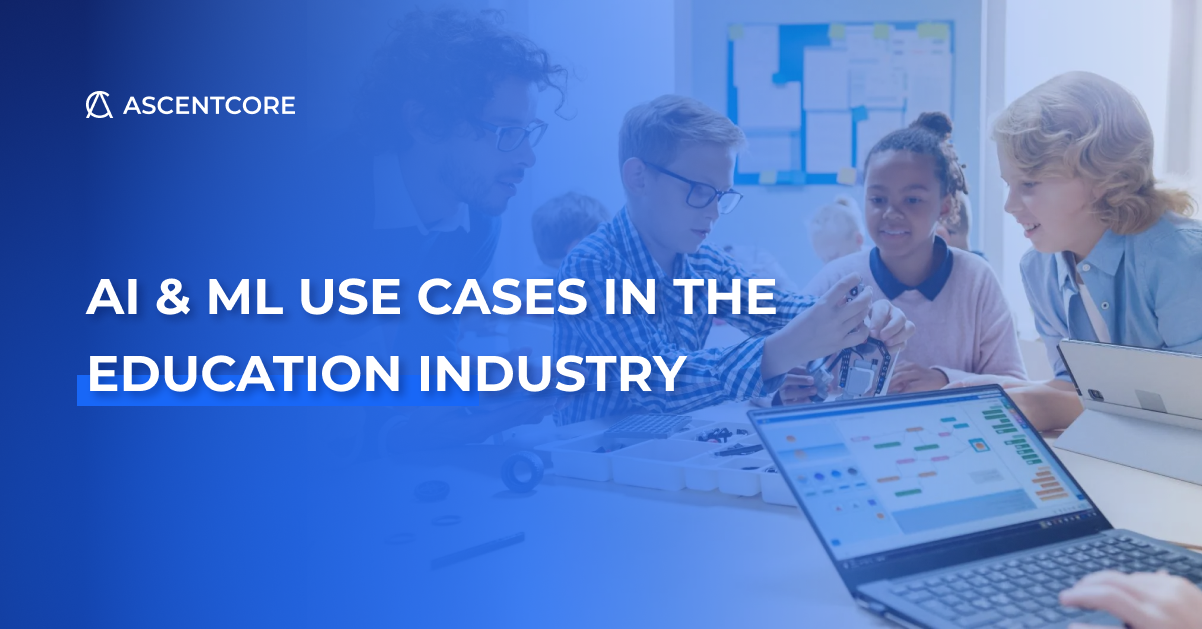Even before the COVID-19 pandemic forced many industries to accelerate their digital transformation efforts, education industry leaders had already been moving toward leveraging emerging tech such as AI and VR. In fact, market research from Technavio had predicted a CAGR of 48% in AI’s market in the US education sector during 2018-2022 – and that was before the pandemic!
The potential for technology such as AI and ML to close gaps and solve real-world problems in education is enormous and we’ve already seen an increase in EdTech funding worldwide. However, there is still a challenge in gaining widespread adoption of digitalization, gaining trust among leaders and stakeholders, and ensuring proactive allocation of funds to effectively implement solutions.
As such, we’ll explore a few use cases of the power (and benefits) of AI and ML technology in the education sector and how this tech can continue to make a difference in the future.
Digital exams and assessments
While online learning and exams are nothing new, the pandemic forced widespread adoption of digital alternatives to pen and paper exams and assessments. Educational institutions experimented with solutions such as providing online assignments, graduating everyone, or gleaning progress from students’ previous grades. But implementing high-stakes exams (such as those required for graduation) can be challenging for institutions to conduct online.
Enter artificial intelligence. Solutions that are seeking to evaluate the efficacy of online exam environments could soon gain ground through tech such as retinal tracking, environment stimulus tracking, and IP tracking. The data generated from such tools, combined with the power of machine learning, could help automatically generate exam papers and assist teachers with focusing on online facilitation. Talent assessment company, Mercer | Mettl provides digital exam solutions using AI and ML and says their “AI has been trained with more than 2.8 million proctored assessments that can detect over 18 dynamic digressions with 95% accuracy.”
Virtual assistance
In 2015, Georgia Tech students were shocked to learn that the teaching assistant they’d been interacting with all semester was actually a bot. A favorite among students of the AI course, the bot had answered questions and assisted students without them realizing they had been experiencing artificial intelligence at its best.
Many teachers, across levels of education, struggle to provide students with the one-on-one attention they often need. But by leveraging AI and ML, virtual assistants can take some strain off teachers and help answer real-time questions. This leaves teachers with more time for lesson planning and other important tasks. Using the chats from the Georgia Tech chat bot, the team was able to feed an AI program capable of answering FAQs with 97% accuracy.
Help with special education
The education sector has long struggled to adequately serve students with special needs and equip teachers with the resources to ensure they succeed. The sudden and rapid shift to online learning brought on by the pandemic only served to exacerbate the problem and widen the achievement gap for students with special learning needs. However, AI and ML can provide a huge boon in these situations. Not only can AI provide customized learning plans for special needs children, it can also rapidly learn and adjust from a student’s learning speed and time to make improvements. AI and ML can provide a much needed supplement for educators in both digital and physical classrooms and give students the personalized attention they need.
Otismo, an app for special education and speech therapy, says it uses AI for speech therapy and leverages ML for voice recognition to understand what a child is saying and to complete the progress bar accordingly.
Managing student loans
Student loan debt has been a hot topic for years now, and rightfully so. Student loan debt in the US alone stood at $1.6 trillion in 2019. That’s more than the combined GDP of Poland, Sweden, and Belgium. However, AI could help both banks and the education sector better manage this debt and prevent loan defaults. AI models can help banks and governments predict defaults on loans and find and suggest alternative solutions for students to avoid defaulting on their loans. ShapingEDU, a project at Arizona State University is working to build an artificial intelligence solution to better understand and provide solutions to the student debt crisis.
Moving the industry forward
The world has already seen the power of AI and ML in a multitude of use cases – from home security to manufacturing automation – and the education sector holds just as much potential for this technology. Better serving students with special needs, providing virtual assistance, and managing the student debt problem are just a few of the ways in which AI and ML could provide unique solutions, and move the industry forward.
At AscentCore, we provide end-to-end product development services, including specialized expertise, in a wide cross-section of industries and solutions. With a focus on AI and ML, we deliver transformational results for our clients by leveraging the latest technology and empowering companies to disrupt, transform, accelerate, and scale. Find out more about us.



